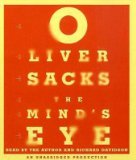by Oliver Sacks
read by Oliver Sacks and Richard Davidson
Random House Audio, 2010. 8 hours, 30 minutes on 7 discs.
Starred Review
This was perhaps not the best thing to listen to after having had a stroke, since it told me things that could have happened to me and made me hyperaware of new symptoms. However, this book was completely fascinating, and I found myself talking about it to people the whole time I was listening to it.
Richard Davidson read most of the audiobook, but Oliver Sacks gave introductions to each chapter, and completely read the chapter about his own experience with vision problems and the tumor he had growing on one eye. Both narrators were excellent, though I was a little jarred when Oliver Sacks’ section ended. I would have preferred that to be the final section, though he did follow a logical progression from vision difficulties on to complete blindness.
The book talks about vision and the brain. He begins describing cases where people suddenly lost their ability to read, because of a brain injury. They can still recognize letters of the alphabet, but not put them together as words unless they spell them out or write them out. Many of these people can still write, but they cannot read. Oliver Sacks delves into several different cases and how the people found ways to cope.
He progresses to people with face blindness, who can’t recognize people or places. I was very surprised to learn that Oliver Sacks himself has a certain amount of face blindness. He has, on occasion, failed to recognize himself when passing a mirror. I thought it was even more striking that one time he looked through a window, saw a tall man with a beard, and started trying to groom his beard, thinking it was a mirror. He talked about people with much worse disability in this area, who had to figure out how to cope without being able to recognize commonplace objects by looking at them.
And there’s more. He talks about several different variations of problems in the visual cortex. When he had cancer and lost vision in one eye, he said it wasn’t just as if half his visual field were cut off; it was as if people who went into his large blindspot actually disappeared.
The final section on blindness was also fascinating. Some people get extra good at visualizing, including an engineer who could now visualize going inside an engine to repair it. Another person lost the ability to visualize at all, but gained an enhanced ability to sense things in other ways.
This entire book is fascinating. The mind is amazing, and we can learn much about how it works by seeing how people cope when a small part is damaged. This is a fascinating look at vision and perception and the way we relate to the world around us.
Find this review on Sonderbooks at: www.sonderbooks.com/Nonfiction/minds_eye.html
Disclosure: I am an Amazon Affiliate, and will earn a small percentage if you order a book on Amazon after clicking through from my site.
Source: This review is based on a library audiobook from the Fairfax County Public Library.
